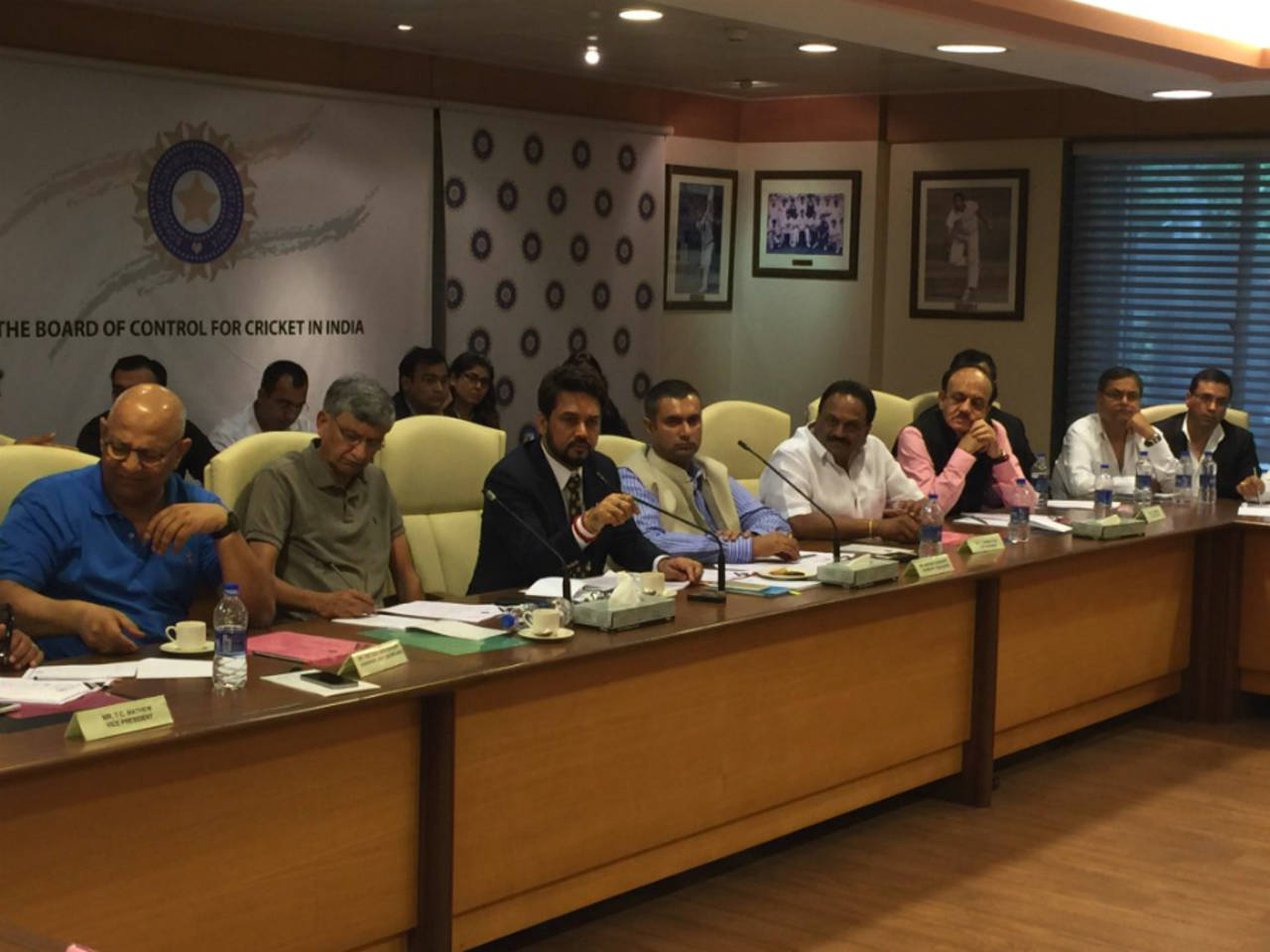During its ongoing tussle with the Lodha Committee, the BCCI's position has been that it cannot adopt all the recommendations approved by the
Supreme Court order on July 18 because its state associations were opposed to some of them. The board said that it could not force the recommendations on its 30 members and a majority vote was required.
In an
interim order on October 21, the Supreme Court had given the BCCI until December 5 to "secure compliance" from its member associations, but that deadline appears unlikely to be met.
On November 5, the BCCI president Anurag Thakur submitted a report to the Lodha Committee saying that its members had voted not to adopt the recommendations in totality at a
special general meeting on October 1. Thakur also submitted the minutes of that meeting to the committee. The following are some of the main recommendations that the BCCI's 30 members voted against.
Apex Council
The Lodha Committee
had recommended that a nine-member Apex Council be the main decision-making body of the BCCI, replacing the existing working committee. At the SGM, two prominent members - Tamil Nadu Cricket Association and Mumbai Cricket Association - raised objections.
TNCA secretary Kasi Viswanathan argued that while the BCCI could only pick one other person for a seat on the Apex Council, the proposed players' association would have two nominees. "The House discussed that as per the ICC model, the representatives from players association are only consulted for cricketing matters and are not on the apex body," the draft minutes of the meeting said.
MCA president Sharad Pawar said the existing working committee "functioned efficiently". After a vote, it was decided that the working committee would be part of the Apex Council, along with the board president, secretary, joint secretary, treasurer and vice-president.
The Lodha Committee had also said a nominee of the Comptroller & Auditor General's office would sit on the Apex Council. The BCCI's members voted against it. They were for including the CAG official in the finance committee, which was not recommended by the Lodha panel. The board also said the official could sit on the IPL governing council.
Election and term of office bearer
The Lodha Committee had said that no office bearer or official could serve more than three consecutive years on the Apex Council as well as at state level. A maximum tenure of nine years would be allowed for office bearers and officials on the Apex Council and they would not be allowed to serve consecutive terms. This is a recommendation the board and states have consistently opposed and that stance did not change.
At the SGM, the BCCI members also voted against adopting the Lodha Committee's recommendations that sought to impose an age cap of 70 on office bearers; bar ministers, government servants, and past or present officials from other sporting bodies, from becoming BCCI office bearers; prevent office bearers who have already completed nine years in the BCCI from contesting again.
The minutes stated the recommendation was discussed in detail but no reasons for the rejection were listed. It only said the members felt that these recommendations would "in no way help to better the game of cricket".
Duties of the CEO
The Lodha Committee had recommended that the daily affairs of the board be managed by a CEO, who would be appointed by the Apex Council. However, once the BCCI's members were appraised of the CEO's role as recommended, they voted against it because he could become the "chairman" and supersede the BCCI secretary, the second most powerful person in the board at present.
"The members discuss the CEO, his function and the Secretary's functions and decide that the Secretary's functions as provided in the present constitution of the Board should be continued. The CEO is accepted, however his function to be modified accordingly. Also CEO should be made reportable to the Hon. Secretary," the minutes said.
One state one vote
The Lodha Committee had said that each state would be a full member and have a vote at BCCI elections, but no state could have more than one vote.
It also said that for states with multiple members - Maharashtra and Gujarat - the BCCI would "recognise" one of them to represent the state, while others would become associate members.
At the SGM, Pawar said Maharashtra, Mumbai, Vidarbha, Cricket Club of India, Gujarat, Baroda and Saurashtra - the associations that would be affected - "have supported BCCI and game of cricket since the good old days and their special status and rights should continue."
BCCI treasurer Anirudh Chaudhry said giving full membership to all states would leave "no incentive" for associations to develop cricket in their territories.
Brijesh Patel, secretary of the Karnataka State Cricket Association, suggested that associate members should be given "weighted" membership. The members voted in favour of following the ICC model when granting full membership to associates. "All existing members of the Board to continue with a vote and new members to be made Associate Members and given a weighted vote, based on the ICC model, where one nominee is elected from all associate member to represent them on the Board and guideline for movement from Associate Member to Full Member."
Nagraj Gollapudi is a senior assistant editor at ESPNcricinfo
